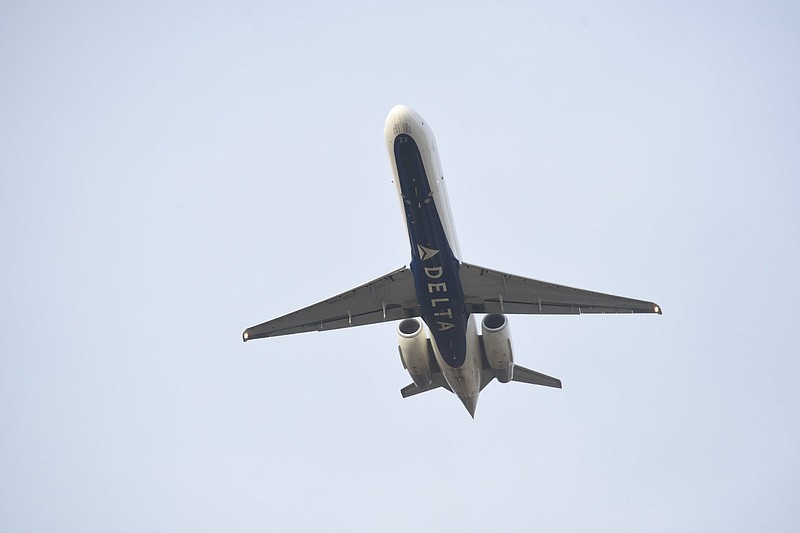Delta Air Lines requires vaccines for new hires
Delta Air Lines will require new employees to be vaccinated against COVID-19 starting Monday.
The airline won't impose the same requirement on current employees, more than 60% of whom are vaccinated, a Delta spokesman said Friday. Delta has about 74,000 employees.
American, United, Southwest and Alaska airlines, however, said they do not plan to require vaccination for current employees or new hires. American Airlines said it gives vaccinated employees an extra vacation day and a $50 gift card.
Delta's decision comes as the U.S. Centers for Disease Control and Prevention says that fully vaccinated Americans can stop wearing face masks in most settings. But a federal rule imposed in January still requires passengers and crews on airlines and trains to cover their faces.
Delta CEO Ed Bastian told CNN he will encourage current employees to get vaccinated but won't require it "if there is some philosophical issue they have" against getting the shots. However, he said, unvaccinated employees probably won't be able to work on international flights because foreign governments are likely to require vaccination for anyone entering their countries.
Delta, which operates a vaccination center at its flight museum in Atlanta, says the new policy is designed to protect other employees and passengers as travel recovers from last year's lows during the worst of the pandemic.
Air travel has risen gradually since hitting a low point in April 2020, with the recovery gaining speed in recent weeks. On Thursday, the Transportation Security Administration screened 1.74 million people. That was the highest number of people at U.S. airports since March 2020, although it was still 33% below the figure for the comparable day in 2019.
Retail sales fall flat during April
Retail sales in the U.S. were flat in April after soaring in March, when many Americans received $1,400 stimulus checks that boosted spending.
The report Friday from the U.S. Commerce Department was worse than the 0.8% rise Wall Street analysts had expected. But it wasn't all bad: March's number was revised upwards to 10.7%. Americans started receiving a third round of stimulus checks that month, helping retail sales soar.
The question is whether consumers will continue to spend without stimulus checks. "The April retail sales tip the odds toward slower sales in the coming months," said analysts at Contingent Macro Advisors.
Friday's report comes amid other signs the economy is improving as vaccinations accelerate and business restrictions are relaxed. The number of Americans seeking unemployment benefits fell last week to 473,000, a new pandemic low. And consumer confidence hit its highest level last month since the pandemic began.
On Thursday, the U.S. Centers for Disease Control and Prevention said vaccinated Americans don't need to wear a mask or social distance outdoors and in most indoor settings, which may get more people to travel, eat out or shop.
Industrial output up 0.7% during April
U.S. industrial production increased for a second straight month in April as more factories came online after being shutdown by winter ice storms.
Industrial production - which includes output at factories, mines and utilities - rose 0.7% last month, down from a sharp increase of 2.4% in March, the Federal Reserve reported Friday. The March gain, however, was revised sharply higher from an initial estimate of a 1.4% rise.
Manufacturing output climbed 0.4%, down from a strong 3.1% in March that was also revised higher.
Strong consumer demand from Americans flush with cash after a series of stimulus checks is encouraging more output, but shortages of semiconductors and raw materials such as copper are pushing in the other direction and holding it back.
Auto production fell 4.3% in April, largely because car makers can't find enough semiconductors. But the output of computers, electrical equipment and appliances, machinery, and metals such as steel all increased.
"Recovery in industrial output, especially manufacturing, is ongoing and is likely to remain supported by still-strong demand for goods," said Rubeela Farooqi, chief economist at High Frequency Economics. "But supply chain bottlenecks are an ongoing headwind in the near term."
Utility production climbed 2.6%, after a sharp drop in March. And mines lifted production 0.7% last month.
German billionaire gone missing is dead
A German court on Friday officially declared billionaire Karl-Erivan Haub dead, more than three years after the head of retail group Tengelmann went missing in the Swiss Alps.
Haub, who was 58, was training for a ski mountaineering race when he disappeared under Switzerland's famous Matterhorn peak, located on the southern border with Italy.
He was last seen on the morning of April 7, 2018, as he headed up a mountain lift with skis and a daypack, and was reported missing to police the following morning after he failed to show up at his hotel in the Swiss resort of Zermatt.
Haub's family gave up hope of finding him alive after a week and the search for him was officially called off in October 2018.
The district court in Cologne, where Haub lived, said Friday it has now formally declared him dead, giving the time of death as midnight on April 7, 2018. Haub was born on March 2, 1960 in Tacoma, Washington and was a German-U.S. dual citizen.
.
